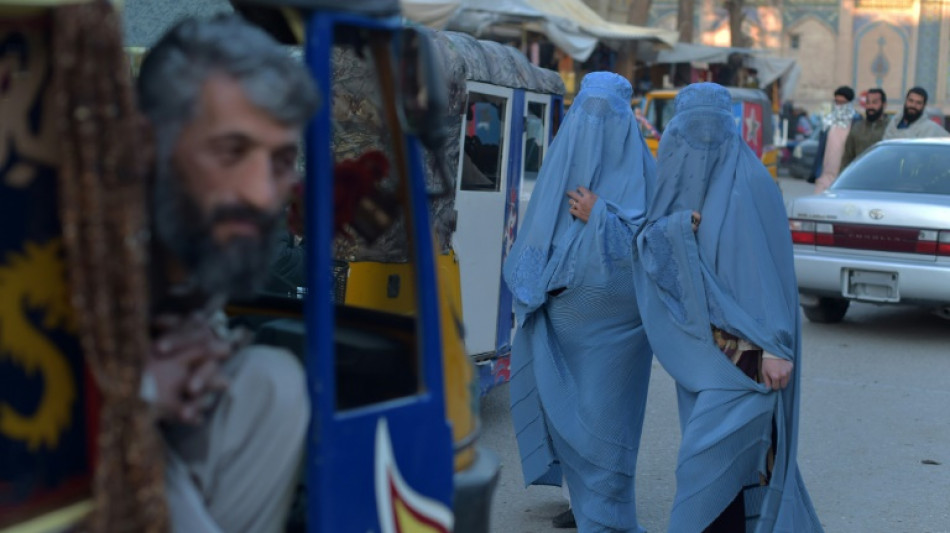
-
 Brazil's Bolsonaro placed under 24-hour watch ahead of coup trial verdict
Brazil's Bolsonaro placed under 24-hour watch ahead of coup trial verdict
-
Taylor-Travis love story: 5 things to know

-
 Sports world congratulates Swift and Kelce on engagement
Sports world congratulates Swift and Kelce on engagement
-
Wolves inflict more woe on West Ham, Leeds crash out League Cup

-
 Venezuela deploys warships, drones as US destroyers draw near
Venezuela deploys warships, drones as US destroyers draw near
-
French political turmoil sends European stocks down, Wall Street edges up
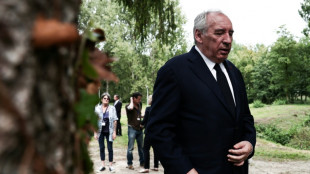
-
 Sinner, Swiatek romp through at US Open
Sinner, Swiatek romp through at US Open
-
Meta to back pro-AI candidates in California

-
 Yankees-Giants set for earliest US MLB opener in 2026 schedule
Yankees-Giants set for earliest US MLB opener in 2026 schedule
-
Messi will be game-day decision for Miami in Leagues Cup semis

-
 'Swiftie' Swiatek swats Arango, talks Taylor & Travis engagement
'Swiftie' Swiatek swats Arango, talks Taylor & Travis engagement
-
SpaceX set once more for Starship test flight

-
 Sinner begins US Open defence with quick win
Sinner begins US Open defence with quick win
-
Who is Lisa Cook, the Fed governor Trump seeks to fire?
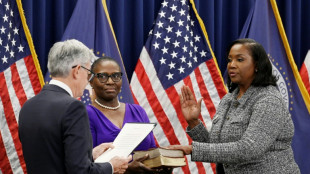
-
 Masters updates qualifying criteria to add six national opens
Masters updates qualifying criteria to add six national opens
-
New era unlocked: Taylor Swift and Travis Kelce announce engagement

-
 Trump to seek death penalty for murders in US capital
Trump to seek death penalty for murders in US capital
-
Taylor Swift and Travis Kelce announce engagement

-
 Swiatek swats Arango, Sinner launches US Open defence
Swiatek swats Arango, Sinner launches US Open defence
-
Swiatek swats Arango to reach US Open second round

-
 Tokyo-bound Duplantis, Lyles headline Diamond League finals
Tokyo-bound Duplantis, Lyles headline Diamond League finals
-
Trump joins backlash against US restaurant Cracker Barrel

-
 US revokes visa of Brazil justice minister in Bolsonaro row
US revokes visa of Brazil justice minister in Bolsonaro row
-
Leverkusen sign former Real Madrid defender Vazquez

-
 India's Sindhu eyes medal on return to Paris for badminton worlds
India's Sindhu eyes medal on return to Paris for badminton worlds
-
British rider Turner wins Vuelta sprint as Gaudu takes race lead

-
 Sci-fi skies: 'Haboob' plunges Phoenix into darkness
Sci-fi skies: 'Haboob' plunges Phoenix into darkness
-
Liverpool face Isak dilemma ahead of Arsenal visit to Anfield

-
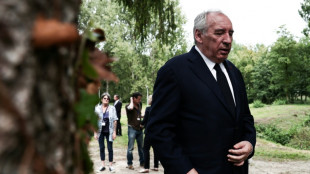 French political turmoil sends European stocks sliding
French political turmoil sends European stocks sliding
-
Spain calls wildfires one of its worst disasters in years
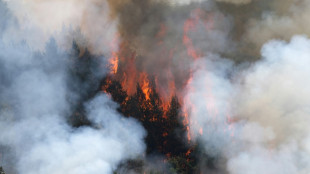
-
 Cadillac choose experienced duo Perez and Bottas for F1 debut
Cadillac choose experienced duo Perez and Bottas for F1 debut
-
Dortmund sign Chukwuemeka from Chelsea until 2030

-
 EU claims 'sovereign right' to regulate tech after Trump threat
EU claims 'sovereign right' to regulate tech after Trump threat
-
Veterans Perez, Bottas to drive for Cadillac in debut F1 season

-
 Living in 'sin'? Ronaldo, Rodriguez highlight Saudi double standard
Living in 'sin'? Ronaldo, Rodriguez highlight Saudi double standard
-
Stocks drop on France turmoil, Trump's Fed firing

-
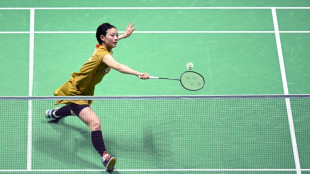 Miyazaki overcomes 'anxiety' to win on badminton worlds debut
Miyazaki overcomes 'anxiety' to win on badminton worlds debut
-
Sri Lanka's jailed ex-president granted bail
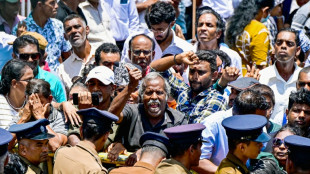
-
 Jennifer Lawrence to get San Sebastian Festival award
Jennifer Lawrence to get San Sebastian Festival award
-
The European laws curbing big tech... and irking Trump

-
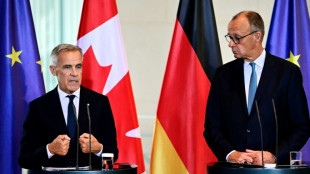 Germany, Canada to cooperate on key raw materials
Germany, Canada to cooperate on key raw materials
-
Dortmund extend coach Kovac's contract

-
 Aid to famine-struck Gaza still 'drop in the ocean': WFP
Aid to famine-struck Gaza still 'drop in the ocean': WFP
-
Japanese climber, 102, sets Mount Fuji record

-
 Israeli protesters call for hostage deal ahead of cabinet meeting
Israeli protesters call for hostage deal ahead of cabinet meeting
-
Sinner, Swiatek, Gauff launch US Open title bids

-
 US bids to trump China in DR Congo mining rush
US bids to trump China in DR Congo mining rush
-
1 in 4 people lack access to safe drinking water: UN
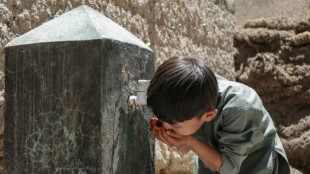
-
 A cut above: new-look Alcaraz eases into US Open round two
A cut above: new-look Alcaraz eases into US Open round two
-
India's Election Commission under fire from opposition
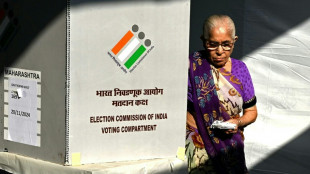

Taliban order Afghan women to cover fully in public
The Taliban on Saturday imposed some of the harshest restrictions on Afghanistan's women since they seized power, ordering them to cover fully in public, ideally with the traditional burqa.
The militants took back control of the country in August last year, promising a softer rule than their previous stint in power between 1996 and 2001, which was marked by human rights abuses.
But they have already imposed a slew of restrictions on women -- banning them from many government jobs, secondary education, and from travelling alone outside their cities.
On Saturday, Afghanistan's supreme leader and Taliban chief Hibatullah Akhundzada approved a strict dress code for women when they are in public.
The decree said the best way for a woman to cover her face and body was to wear the chadari, a traditional, blue, all-covering Afghan burqa.
"They should wear a chadari as it is traditional and respectful," said a decree approved by Akhundzada and released by Taliban authorities at a ceremony in Kabul.
"Those women who are not too old or young must cover their face, except the eyes, as per sharia directives, in order to avoid provocation when meeting men who are not mahram (adult close male relatives)," it said.
The order was expected to spark a flurry of condemnation abroad.
Many in the international community want humanitarian aid for Afghanistan and recognition of the Taliban government to be linked to the restoration of women's rights.
Akhundzada's decree also said that if there was no reason for women to step out of their homes then it was "better they stay at home".
During their first regime, the Taliban made the burqa compulsory for women.
Since their return to power, their feared Ministry for the Promotion of Virtue and Prevention of Vice has issued several "guidelines" on what women should wear, but Saturday's edict was one of the harshest national orders restricting women's rights.
"Islam never recommended chadari for women," said a women's rights activist who asked not to be named.
"I believe the Taliban are becoming regressive instead of being progressive. They are going back to the way they were in their previous regime."
Another women's rights activist Muska Dastageer said Taliban rule had triggered "too much rage and disbelief".
"We are a broken nation forced to endure assaults we cannot fathom. As a people we are being crushed," she said on Twitter.
The hardline Islamists triggered international outrage in March when they ordered secondary schools for girls to shut, just hours after they reopened for the first time since their seizure of power.
Officials have never justified the ban, apart from saying girls' education must be according to "Islamic principles".
That ban was also issued by Akhundzada, according to several Taliban officials.
Women have also been ordered to visit parks in the capital on separate days from men.
Some Afghan women initially pushed back strongly, holding small demonstrations and protests where they demanded the right to education and work.
But the Taliban cracked down on these unsanctioned rallies and rounded up several of the ringleaders, holding them incommunicado while denying they had been detained.
In the 20 years between the Taliban's two stints in power, girls were allowed to go to school and women were able to seek employment in all sectors, though the country remained socially conservative.
Many women already wear the burqa in rural areas.
F.Müller--BTB
